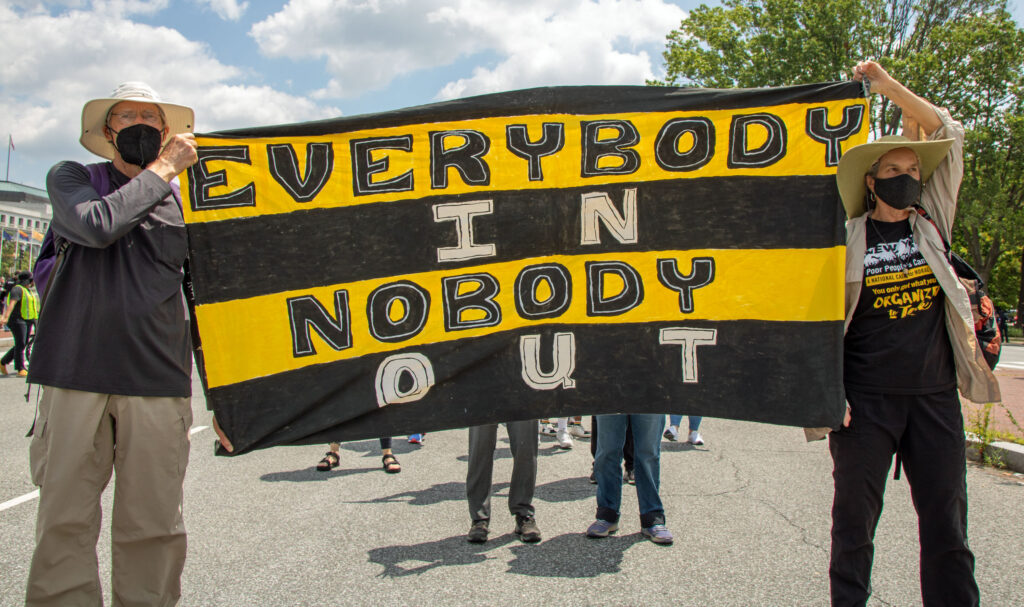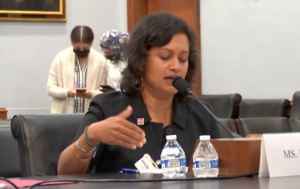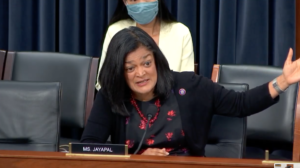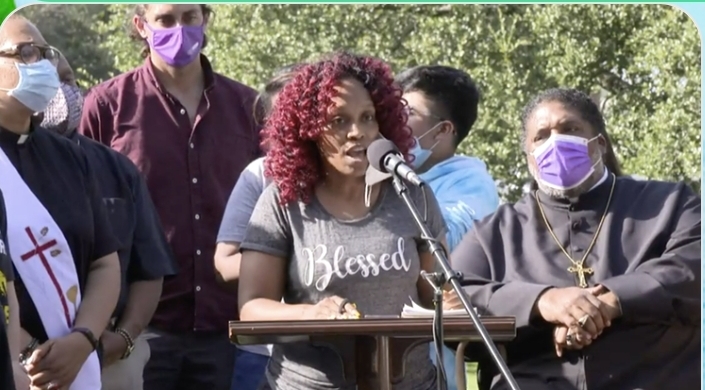
On July 29, I testified for the Poor People’s Campaign on Capitol Hill at the inaugural hearing of the House Select Committee on Economic Disparity and Fairness in Growth. Chaired by Rep. Jim Hines (CT), the Committee’s members include Representatives Marcy Kaptur (OH), Gwen Moore (WI), Vicente Gonzalez (TX), Pramila Jayapal (WA), Angie Craig (MN), Alexandria Ocasio-Cortez (NY) and Sara Jacobs (CA). The Committee was convened by Speaker Nancy Pelosi, who said at the end of the hearing: “The two hours I spent here, for me, were so valuable and so necessary because [economic disparity] not only undermines who we are as a people – it completely threatens our democracy. So, we don’t have any more important work to do than what we’re focusing on here.”

The other panelists – Jason Furman, former Chair of President Obama’s Council of Economic Advisers, Joi Chaney of the National Urban League, James Kenneth Galbraith from the University of Texas at Austin and Janet Currie from Princeton – are among the first tier of experts invited to inform elected officials, and society as a whole, on the pressing problems we face as a nation. Very rarely are those who are most impacted by these problems also at the table. When they are, it is usually as witnesses to and victims of economic injustice.

The Poor Peoples’ Campaign offers a very different expertise, one that is informed by more than two decades of organizing against economic disparity and its root causes.
We challenge what is commonly understood about our economy and public policy, because the very fact that there are 140 million people who are poor or near poor is a challenge to how our entire society is organized. The 140 million are proof that poverty is not an accidental by product of an otherwise sound economy. They push us to ask: How is it possible for 40 percent of the population to be living on the edge of economic ruin in the richest nation in the world? Who benefits from that wealth? Why isn’t it used to end this widespread poverty?
The very fact that there are 140 million people who are poor or near poor is a challenge to how our entire society is organized.
In his last speech to the SCLC staff in 1967, Rev. Dr. King raised similar questions. He said: “One day we must ask the question, ‘Why are there forty million poor people in America [in 1967]?’ And when you begin to ask that question, you are raising questions about the economic system, about a broader distribution of wealth…And I’m simply saying that more and more, we’ve got to begin to ask questions about the whole society. We are called upon to help the discouraged beggars in life’s marketplace. (Yes) But one day we must come to see that an edifice which produces beggars needs restructuring. (All right) It means that questions must be raised. And you see, my friends, when you deal with this you begin to ask the question, ‘Who owns the oil?’ (Yes) You begin to ask the question, ‘Who owns the iron ore?’ (Yes) You begin to ask the question, ‘Why is it that people have to pay water bills in a world that’s two‐thirds water?’ (All right) These are the questions that must be asked.”
Equally important as raising these questions is establishing who has the legitimacy and authority to answer them. A recent 5-part series on wealth inequality in the Washington Post provides a good example of the kinds of answers we usually hear, all of which fall short of the radical redistribution of political and economic power that this moment calls for. The first article claims a victory for democratic capitalism, despite heightened assaults on the right to participate in our democracy (at least 18 states have passed voter suppression laws in 2021) and the worst economic polarization of any other comparably wealthy country. The second and third articles put forward ideas to shrink the wealth gap: tax “passive wealth”, namely capital gains and inheritance, to “trim the undue advantages” from the top; and use home ownership, financial investments, training and education to lift from the bottom. The fourth article focuses on the racial wealth gap, pointing to the harrowing fact that median Black household wealth was 12 percent of white household wealth in 2019 and how the solutions in the earlier articles would be a step forward.
The series then concludes by lauding the wealth inequality it set out to address: “Every billionaire is not a policy mistake. To the contrary, seven of the 10 richest individuals in the Forbes 400 are founders of transformational new businesses. (One, Jeff Bezos, the founder of Amazon, is also the owner of The Post.)… Private wealth can serve democracy, provid[ing] a bulwark against presidential authoritarianism and other forms of government overreach…”
In fact, the entire series is an impassioned defense of private wealth. A society where the top 10 percent hold nearly 80 percent of all wealth needs an overhaul, not just a “trim.” By focusing on “passive” wealth, the series fails to account for how the wealthy are “actively” increasing their wealth through land grabs and the privatization of public assets, like water, health, housing, education and intellectual property rights. To realize the benefits of the “bottom-up” ideas, we would also need well-paying and steady jobs, living wages, affordable health care, paid leave and childcare; yet, none of these are guaranteed or readily available, especially to those at the far end of the wealth gap. Nor does the series take into account the crushing debt facing households – nearly $15 trillion in the second quarter of 2021 – let alone the distortionary economic effects of our military spending.
In coming to the defense of billionaires, the series maintains and perpetuates a poverty-producing system.
Perhaps most revealing is how the series relies on perverse narratives about hard work, philanthropy and the role of government that have been used against the poor, especially poor people of color, for decades. Their answers do not challenge the injustices of our current economic structure. Rather, in coming to the defense of billionaires, the series maintains and perpetuates a poverty-producing system.
This is why it is so meaningful that the Poor People’s Campaign was part of the hearing in July. We are re-shaping the national conversation on economic disparity and cutting through these distorted narratives. As Denita Jones, a leader with the Texas Poor People’s Campaign, recently said at a Campaign rally in Austin, “In Texas, we are tired. We are tired of struggling and we will not take anymore, because in Texas, we are Texas strong. We will fight. We will march until the cows come home. My father used to tell me growing up and I never understood what it meant until I was an adult. (I want to apologize to the pastors and the ministers about what I’m going to say.) My father used to tell me don’t piss on my back and tell me it is raining.”

The 140 million people who are struggling every day do not need another billionaire to save them. They need housing, health care, water, good public schools and clean air. They need their families to be safe from poverty, policing, incarceration and immigration policies that separate and devastate their communities. They need all of this now, not ten years from now.
Speaker Pelosi is right. We don’t have any more important work than this.
Below is the full transcript of my testimony. You can also watch the full hearing and read submitted testimonies here.
House Select Committee on Economic Disparity and Fairness in Growth
Inaugural Hearing on the Nature and Consequences of American Economic Disparity
July 29, 2021
Thank you, Chairman Hines and members of this Committee, for calling attention to economic disparity in America and the invitation to participate in this hearing. I am the Policy Director of the Poor People’s Campaign: A National Call for Moral Revival and the Kairos Center for Religions, Rights and Social Justice. I have a background in economics, law and human rights and the experiences gained from working with and for poor and dispossessed people for more than 17 years.
The Poor People’s Campaign is committed to ending the injustices of systemic racism, poverty, ecological devastation, militarism and the false narrative of Christian nationalism. We are rooted in more than two decades of organizing among poor and low-income communities and, over the past three years, have established a national campaign across 45 states in the country, with a network of more than 200 organizational partners, labor unions and thousands of faith leaders, including national denominations, who together represent tens of millions of people.
As Policy Director, I have worked with leading economists and economic and policy institutes to put the conditions facing poor and low-income communities into context. In 2018, we released the Souls of Poor Folk Moral Audit, a report that looked at the past 50 years to assess the economic trends and policies that have brought us to this moment. To compile this report, we included interviews with poor and low-income people who are on the frontlines of these injustices around housing, water, welfare, climate crisis, war, immigration and more, because they are living through the changes that are later studied and reported on by economists and other experts. Their insights helped to inform the issues that were taken up in that report and, as the Committee develops your assessment of our current content, I encourage you to reference that study and the other reports that we have released that carry out this methodology.
What we have learned is that there are 140 million people in this country who are poor or one emergency away from being poor. This includes 35-40 million people who are living below the poverty threshold (SPM) and 95-100 million people who are living right above it. Among the 140 million are: 52.1 percent or 38.5 million children (below 18); 42.0 percent or 21 million elders (above 64); 41.6 percent or 65.8 million men; 45 percent or 74.2 million women; 59.7 percent or 23.7 million Black, non-Hispanic people; 64.1 percent or 38 million Latino/a people; 40.8 percent or 8 million Asian people; 58.9 percent or 2.14 million Native/Indigenous people; and 33.5 percent or 65.6 million white, non-Hispanic people.
The 140 million are not only a set of numbers or statistics. They are leaders and members in the Poor People’s Campaign, and across our 45 state campaigns, who are helping to reveal and diagnose these conditions.
According to a 2021 report from the Urban Institute, the 140 million grew to nearly 150 million in 2020. The conditions facing this massive population – and impacting over 40 percent of the country – include a crisis of low-wages; housing, food and health insecurity; mounting household debts that cannot be paid; polluted air and water; and increasing criminalization, policing and militarism in their communities. There are nearly 50 million people who are working for low wages, including at least 40 percent of Black and Latina/o workers and approximately 30 percent of white workers, while a majority (59 percent) of low wage workers are women. More than half of the low-wage jobs that were lost during the pandemic have not returned. Approximately 30 to 40 million people are at risk of becoming homeless, while an estimated 25-50 million are food insecure, including a disproportionate share of households of color. Leading into the pandemic, 87 million people were uninsured or underinsured and, due to a lack of affordable healthcare, 10 million more people have enrolled in Medicaid since last year. Household debt burdens have swelled to over $14 trillion, with three-quarters of low-income households having difficulty meeting daily household expenses. Columbia University’s Mailman School of Public Health has estimated that 250,000 die every year because of poverty and inequality. There is also profound physical, emotional and mental stress from living under these conditions, the effects of which are not often fully appreciated, but have contributed to shorter life spans among poor and low-income households.
The 140 million are not only a set of numbers or statistics. They are leaders and members in the Poor People’s Campaign, and across our 45 state campaigns, who are helping to reveal and diagnose these conditions. Families who have been separated by unjust immigration policies standing alongside families who have been separated by mass incarceration or welfare policies that punish them by taking their children; communities from the Mississippi Delta to Cancer Alley, from the Appalachian hills to Apache lands, people whose communities and sacred lands are being destroyed by floods, fossil fuels and fracking; from the Rust Belt to the Bible Belt; low-wage workers, veterans, caregivers, students, people of all abilities who cannot afford a place to live, despite working two or three jobs; these people and so many more are showing us not only the depths of the crises we face, but also their solutions.
As Mashyla Buckmaster, a formerly homeless, single mom from rural Washington has said, “I wasn’t homeless because I was stupid or lazy. I was homeless because our society cares more about the billionaires who live in Seattle than a young, pregnant homeless woman in the middle of winter.”
Indeed, alongside the 140 million are a small group of billionaires whose wealth has grown dramatically in recent months. Before the pandemic, just three individuals owned as much wealth as half the country. Between March 2020 and July 2021, billionaire wealth grew by almost 60 percent, from $2.9 trillion to $4.7 trillion. In fact, one-third of billionaire wealth gains over the past 30 years have come during this period of time.
While hastened during the pandemic and its economic fallout, these two extremes are not due to the pandemic alone. Rather, they are the predicable outcome of intentional policy choices that aimed to redistribute economic leverage and bargaining power upward and away from shared economic progress. Over the past four decades, as our economy has become increasingly more productive, an accumulation of dozens, if not hundreds, of policy choices made in the form of legislation, regulatory changes and administrative decisions have consistently put a thumb on the scale of the conflict over who would see benefits from that economic growth. As corporations and employers have been prioritized over communities and workers, anti-poverty programs have been consistently underfunded, while spending on war, prisons, and immigration enforcement has steadily increased and the threats to our planet and environment have multiplied. Out of every federal discretionary dollar, 53 cents goes towards military spending and only 15 cents on anti-poverty programs. These choices were made more likely and possible as our democracy has been weakened by voter suppression, keeping those who are most impacted by these skewed priorities out of our political system.
Although the 140 million do not run this country, they make it run. When they are in crisis, our entire economy suffers. Rising inequality is associated with slower overall economic growth and more persistent poverty. In fact, there are costs to maintaining a vastly unequal economy. The aggregate costs of child poverty, considering everything from child homelessness to crime and health costs to lost economic productivity, is estimated at $1 trillion per year. Similarly, barriers to full labor market participation and compensation by women and people of color were estimated at $2.6 trillion of our gross domestic product in 2019. Inaction on climate change may cost close to $3.3 trillion annually. We have spent $6.4 trillion on endless wars over the past twenty years, even while the federal minimum wage has stagnated at $7.25 an hour.
Although the 140 million do not run this country, they make it run. When they are in crisis, our entire economy suffers.
At the same time, polices that prioritize the poor have been shown to have economy wide benefits. A 2021 report from the Brookings Institute looking at the macroeconomic effects of President Biden’s $1.9 trillion relief package shows that resources given to poor and low-income households had a greater impact on the economy than resources going to businesses. Every dollar that was given to “financially vulnerable” households was multiplied into $1.20, whereas every dollar given to businesses was multiplied into $0.30. Likewise, every dollar spent on SNAP (food stamps) during an economic downturn generates between $1.50 and $1.80 of economic activity and every dollar that goes into raising the minimum wage adds $1.20 in economic activity. The Economic Policy Institute has also estimated that the $600 per week of unemployment insurance provided by the CARES Act was supporting approximately 5 million jobs.
We can no longer try to fit the 140 million into an economic system that has systemically excluded them and there is no economic or moral reason to impose an era of forced scarcity, when we live in an era of abundance.
Earlier this year, the Campaign released a set of 14 priorities for the 117th Congress and the new Administration. They include:
- Updating the poverty measure to get a true accounting of who is poor and expanding our social welfare programs to fully meet these needs;
- Raising the minimum wage to $15 / hour immediately, while moving towards living wages, and protecting the right to form and join unions;
- Expanding Medicaid and providing universal single payer health care for all;
- Enacting a federal jobs program to build up investments, infrastructure, public institutions, climate resilience, and socially beneficial jobs in poor and low-income communities;
- Guaranteeing housing and ending all evictions and foreclosures, as well as guaranteeing access to water, welfare and equitable, diverse public education;
- Relieving debts that cannot be paid, including housing debt, medical debt and student debt;
- Expanding and protecting voting rights;
- Ensuring all of the rights of indigenous peoples, including the right to their sacred lands and the free and full expression of their religion;
- Enacting comprehensive and just immigration reform;
- Demilitarizing our foreign policy, our borders and policing and redirecting these resources towards programs of social uplift; and
- Implementing fair taxation on the wealthy, Wall Street and corporations.
While these priorities begin with the needs of the poor, they will benefit our entire economy. Moral policy, which centers those who are most harmed by our current system, is also good economics. When you lift from the bottom, everybody rises.